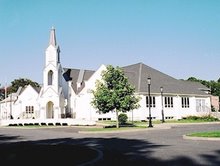Islam, as taught by Muhammad in the Qur'an, a work Muslims believe is the inspired literal word of God, is built upon five duties called the Five Pillars.
• The Creed (Shahada): “There is no god but Allah and Muhammed is his messenger.”
• Prayer (Salat): Faithful Muslims pray a standardized set of prayers five times a day.
• Alms-Giving (Zakat): Once a year based upon their income Muslims must give alms for the poor.
• Fasting (Swam): Throughout the daylight hours of the lunar month of Ramadan, observant Muslims must fast.
• Pilgrimage (Haj): If they can, all Muslims must go on pilgrimage once in their lifetime to Mecca .
Since Muhammad was both a political and a spiritual leader, the “Islamic Way” or “Shariah,” derived from the Qur'an and other Islamic texts, has led to the Shariah Law which governs the way modern Islam interacts with the non-Islamic world. Like Christianity, Islam has a vision of how people should live in this world, and it strives to create social and political structures in which people live according to this vision, sometimes down to the last detail.
Most (95%) of all Muslims are Sunni Muslims who believe that their leaders should be chosen by consultation and consensus. A small (3%) group called Shiite Muslims believe that only direct descendants of Muhammad can be Muslim leaders. Both groups embrace the Five Pillars. But they differ significantly on how Muslims should live in religiously and politically pluralistic societies.
The Islamic community is growing rapidly in Europe . There are several million Muslims in the United States , substantial numbers in many metropolitan areas. And their numbers continue to grow. In time Islam may well be a major force in this country. I enjoyed and continue to enjoy an excellent relationship with Ahmed El-Mamlouk , the Imam of the growing Muslim community in Lake Charles . He is a gracious man steeped in Islamic wisdom from the School of Alexandria in Egypt . Well over two million American Muslims worship at mosques each week. There have been disputes in some cities about the call to prayer broadcast from the minarets of mosques ‘imposing” Islam on Christians and counter arguments that church bells “impose” Christianity on Muslims.
Since Islam has no worldwide central authority, fragmentation and sectarianism are not uncommon. This may be especially the case regarding the issue of how faithful Muslims should live in pluralistic, democratic societies like the United States , which sanctions no state religion and which welcomes diverse religious traditions. Some Muslims prefer an Islamic state, like Iran or Saudi Arabia , where religious leaders who apply the Qur'an to everyday life making no distinction between secular and religious life hold the highest political positions. This is a part of the current difficulty in forming a new government in Iraq .
One very austere Islamic sect called Wahhabism (started by Muhammed bin Abd al-Wahhab (1703-87), the co-founder of Saudi Arabia ) calls for the strictest interpretation of the Qur'an. Its followers reject what they see as the materialistic, self-indulgent secularism of western (especially American) culture. It is the Wahhabi sect from Saudi Arabia that has shaped the violent extremism of Osama bin Laden. to be continued...
Saturday, October 28, 2006
Rapid Growth of Islam, Uniqueness of Christianity (Part 2 of 3) - July 9, 2006
By Bishop Edward K. Braxton, the Bishop of Belleville, Illinois.

No comments:
Post a Comment